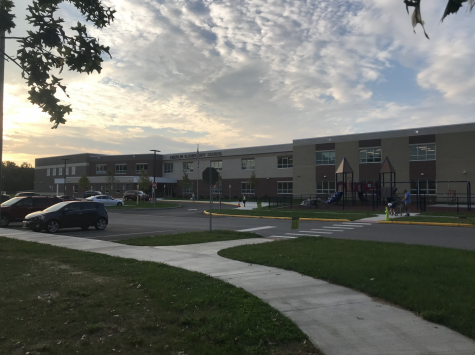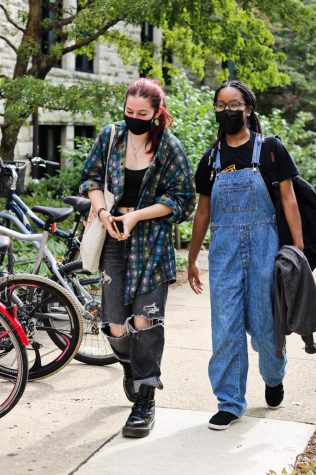Boosters Come to Campus While Staff Vaccinations Lag
On Wednesday, an ObieSafe update released information about new Centers for Disease Control and Prevention recommendations published last week, which gave a description about who is eligible to seek a booster vaccine for COVID-19. Meanwhile, the College is seeking compliance with the vaccination mandate from staff members.
As of Monday, Oberlin has a campus-wide vaccination rate of 96 percent. However, at this point, only 84.5 percent of staff have turned in vaccination cards, compared to 98.3 percent of students and 95.4 percent of faculty.
According to Campus Health Coordinator Katie Gravens, faculty and staff are expected to either be vaccinated or have filed an exemption by the Nov. 1 deadline. The vaccine mandate does not apply to employees of dining and custodial vendors, AVI Foodsystems and Scioto, and the College does not keep track of the vaccination data for this group.
“[Human Resources] is working with people who have not uploaded cards and have not filed an exemption,” Gravens said. “They go through the same process that we go through with students. And again, [vaccination] is required to be at Oberlin. For people that ultimately don’t comply, there will be sanctions.”
For students, the vaccination deadline elapsed Oct. 7, and the College is working with some students with extenuating circumstances on an individual basis, according to Gravens. Many international students, for example, are still in the process of receiving their doses because of varying availability of vaccinations in their home countries. Others received vaccines that have not yet been approved by the World Health Organization. Overall, Gravens indicated that vaccination rates look positive, despite the lack of data on the vendors the College contracts with for dining and custodial services.
“We don’t have [vaccination] information, because we cannot require them to have it,” she said. “What we are doing is we are requiring them to test weekly for those who are not vaccinated. We work with AVI and Scioto, so that they then provide the test center with the list of vendors who should be testing weekly.”
Gravens says the ObieSafe layered healthcare strategy was created with multiple protection measures in mind, such as masking and social distancing, in order to mitigate any potential consequences of the relatively low vaccination rates among staff members.
“To me, it’s a little bit concerning, but having the faculty numbers up so high makes me feel pretty safe,” said College fourth-year Jesse Pearlman. “I don’t feel like I’m spending long periods of time in close quarters with staff members, such as dining workers. I feel like having professors and teaching staff at such a high number is really important.”
While the College is working on ensuring faculty, staff, and students have a first dose of the vaccine, this week, many students got the opportunity to get a booster dose of the vaccine they received earlier this year.
People who received the Johnson & Johnson vaccine, people 65 and older, and people 18 and over who have an underlying health condition or live in a high-risk setting are eligible to receive a booster. While students, faculty, and staff who received the Johnson & Johnson vaccine have clear eligibility for the vaccine, Gravens said the circumstances that constitute a “high-risk setting” are less straightforward.
After consulting with Lorain County Deputy Health Commissioner Mark Adams, Gravens determined that students living in a room with multiple occupants are eligible for booster vaccines. According to Gravens, Oberlin will be engaging in talks, starting next week, with the Ohio Department of Health to determine protocols moving forward.
Pearlman, who received the Johnson & Johnson vaccine, plans to get a booster and wonders why the College has not implemented a mandate for individuals for whom a booster is recommended.
“I see no reason not to mandate it,” he said. “If vaccines are already mandated and [Johnson & Johnson’s] is not quite as effective as the others, requiring a booster to raise the efficacy of that vaccine to the level of the others makes a lot of sense to me.”
College third-year Sander Ferrazza also questioned this hesitancy.
“If that’s what CDC is recommending, why not have it be mandated?” Ferrazza said.
At this time, Gravens says the College has not discussed making boosters mandatory, but it is already working on processes through which people would
be able to upload a vaccination card for a booster. The College is also investigating the possibility of reopening a vaccination clinic on campus.
“Because we vaccinated about [600] people with [Johnson & Johnson’s] last year, we’d like to make sure it’s available to them,” Gravens said.
Currently, the Pfizer, Moderna, and Johnson & Johnson vaccines are considered interchangeable as boosters, though they have varying degrees of efficacy. All three vaccines are also accessible to students at off-campus locations, regardless of whether or not the College reopens its clinic. Booster vaccines are available at CVS Pharmacy, Walmart Pharmacy, and Mercy Allen Hospital, which is in walking distance of the College.
“CVS has free COVID[-19] vaccines, and I just got my flu shot there,” Ferrazza said. “It’s actually kind of sad that I just saw the email, because I probably would’ve just gotten my booster right then.”
Gravens will continue to consult with local public health experts to ensure that the College is disseminating clear advice to students as CDC recommendations related to the vaccine evolve and the local public health situation shifts.
“We continue to have all those discussions, but I think we’re moving in a very positive direction right now,” Gravens said. “So I hope that means students see that they can really enjoy their experience at Oberlin, as opposed to feeling fearful.”








